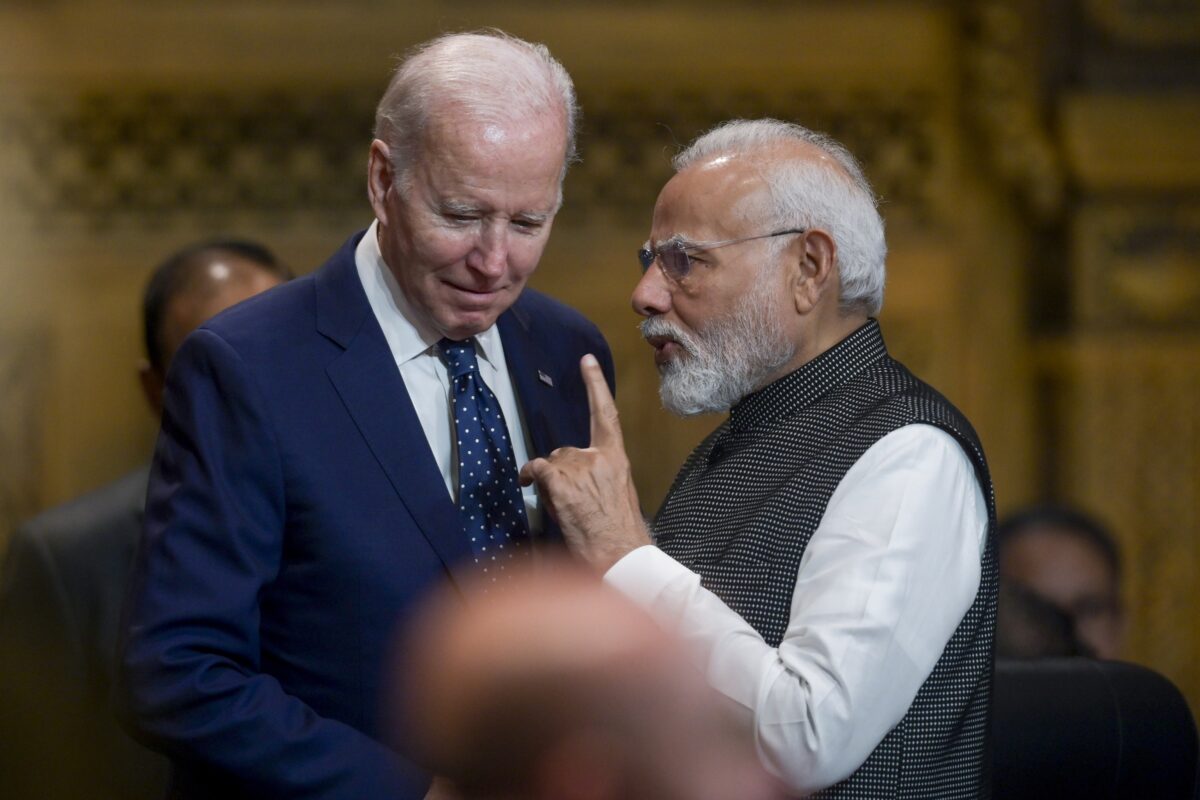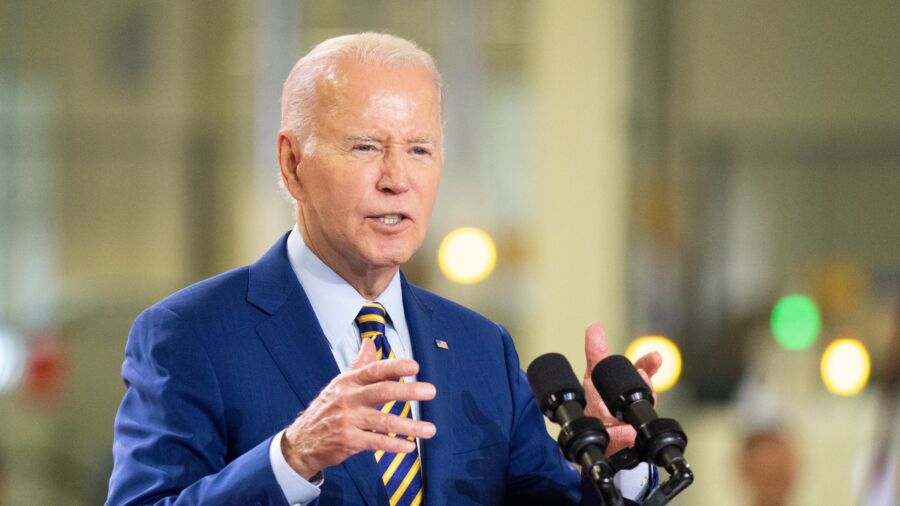WASHINGTON—President Joe Biden is scheduled to travel to India on Thursday, where he plans to address China’s “coercive and unsustainable lending” practices, among other issues, at the Group of 20 (G20) summit in New Delhi that will bring together the leaders of the world’s richest countries.
Beijing announced on Monday that Chinese leader Xi Jinping will not attend the two-day summit, which will begin on Saturday.
President Biden’s trip was also called into question after first lady Jill Biden tested positive for COVID-19 on Labor Day. However, the White House announced on Tuesday that the president would still attend the summit as he tested negative and is experiencing no symptoms of the illness.
“The President certainly is going to test on a regular cadence,” White House press secretary Karine Jean-Pierre said at a press briefing on Tuesday. She added that all travelers, including the president, will be tested before traveling to Asia.
The G20 was formed in 1999 in the aftermath of the Asian financial crisis, and this will be India’s first time hosting the summit.
President Biden’s key priority at the crucial meeting, according to the White House, is to propose strengthening multilateral development banks, particularly the World Bank and the IMF, as an alternative to China’s coercive lending program.
While China has become the world’s largest creditor in recent years, its aggressive lending strategy under the Belt and Road Initiative (BRI) has been criticized for its lack of transparency.
Since its launch in 2013, China’s BRI has poured billions of dollars into infrastructure projects across Africa, Latin America, Eastern Europe, and Asia. In recent years, however, Beijing has been accused of using “debt-trap diplomacy” to lure many nations into its orbit.
“We believe that there should be a high standard of non-coercive lending options available to low- and middle-income countries,” White House national security adviser Jake Sullivan said at the press briefing on Tuesday.
That’s why the United States is championing “fundamentally reshaping and scaling up” these development banks, he noted.
The G20 brings together the world’s major economies; its members account for roughly 85 percent of global gross domestic product, over 75 percent of global trade, and about two-thirds of the world population.
Members of the G20 are Argentina, Australia, Brazil, Canada, China, France, Germany, India, Indonesia, Italy, Japan, South Korea, Mexico, Russia, Saudi Arabia, South Africa, Turkey, the United Kingdom, the United States, and the European Union.
‘Not About China’
In an effort to avoid enraging Beijing, Mr. Sullivan downplayed the main purpose of strengthening multilateral banks, claiming that it is not about China.
“The World Bank reform is not about China, in no small part because China is a shareholder in the World Bank,” Mr. Sullivan argued. “It’s for the entire international community.”
“That is not a negative agenda. That is an affirmative agenda, a positive agenda,” he added.
However, this was in stark contrast to what Mr. Sullivan stated two weeks ago, when it was clear that the entire campaign was centered on countering China’s BRI.
“Given both the scale of the need and, frankly, the scale of [China’s] coercive and unsustainable lending through the Belt and Road Initiative, we need to ensure that there are high-standard, high-leverage solutions to the challenges countries are facing,” Mr. Sullivan told reporters during a conference call on Aug. 22.
Whether President Biden can unite other countries against the Chinese regime during the summit is unclear. Mr. Sullivan said the administration hopes G20 members will back U.S. efforts to reform development banks during the largest gathering of world leaders.
As part of the effort, President Biden asked Congress to provide an additional $3.3 billion for the World Bank in its latest supplemental budget request last month (pdf). The White House expects this funding to leverage over $27 billion in U.S.-backed financing and grants for developing nations.

According to Stephanie Segal, a senior fellow at the Center for Strategic and International Studies (CSIS), the timing is right for the United States to highlight those development banks as an alternative to China.
“China has historically been a source of bilateral financing for many countries in the emerging market and developing world. And I think that source of financing has certainly slowed, if not entirely dried up,” she said during a CSIS press briefing previewing the G20 Summit.
“I think it is a good moment for the U.S. to be able to kind of underscore those institutions and the U.S. commitment to those institutions as an alternative.”
Last year, the Group of Seven (G-7) countries proposed a new infrastructure investment program for developing countries, known as the Partnership for Global Infrastructure and Investment (PGII), to compete with China’s BRI.
Italy, the sole G-7 country to join the BRI four years ago, has recently announced its intention to withdraw from the program.
Italian foreign minister Antonio Tajani said the BRI deal with China “has failed to meet Italian expectations.”
Putin, Xi to Skip Summit
Russian President Vladimir Putin didn’t attend the 2022 summit in Bali, Indonesia, and will also skip this year’s meeting in New Delhi. At the conclusion of the summit last year, the G20 leaders agreed to a joint communiqué in which they stated that “most members strongly condemned the war in Ukraine,” but “there were other views” as well.
Instead of Mr. Xi, Premier Li Qiang will represent China at this year’s meeting. President Biden expressed disappointment after learning that the Chinese leader would not attend the summit. Both leaders last met on the sidelines of the G20 summit in Bali, Indonesia, on Nov. 14, 2022.
“I am disappointed, but I am going to get to see him,” Biden told reporters last Sunday.
However, he did not explicitly say where and when he would meet Mr. Xi.
“Nothing’s been scheduled,” Mr. Sullivan clarified during the press briefing. “The President has said before that he’s looking forward to picking up the conversation that he had with President Xi in Bali last year, and he fully intends to do that.”
President Biden is expected to have a bilateral meeting with India’s prime minister, Narendra Modi, on Friday on the sidelines of the summit.
After the conclusion of the summit, he is scheduled to travel to Vietnam on Sunday. The president will meet with Communist Party General Secretary Nguyen Phu Trong and other top Vietnamese leaders in Vietnam’s capital, Hanoi.
The United States and Vietnam will work to address challenges from the South China Sea to critical and emerging technologies “with an elevated and energized partnership,” Mr. Sullivan said.
From The Epoch Times

